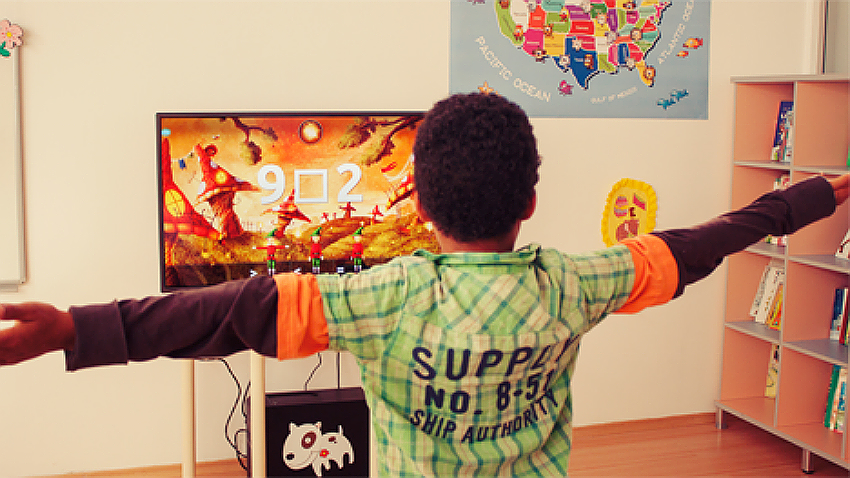Students who are impatient for the maths class to start – this is the result of the Jumpido system, created by Kiril Rusev, Deyan Russev and Nikola Kosev. More about the system from Kiril:
“Jumpido is an educational system that facilitates math learning as it engages children physically. The system includes a motion sensor and educational games. Children stand in front of the motion sensor and the software recognizes their movements. They can control the cursor on the screen by hand; they can jump, squat and kick, depending on the games and the actions they need to perform. Jumpido combines elements of traditional education with movement.”
On the one hand, the system facilitates individual approach - the content adapts to the level of each child. This way Jumpido also helps teachers in their work. Moreover, Jumpido has always aimed at being a product distributed also outside Bulgaria. According to the creators, maths is the easiest way to reach children around the globe.
“The problem we are trying to solve is universal. It lies in the fact that very often there is lack of movement in classrooms. The fact that we focus on mathematics allows us to find solutions in useful and entertaining ways for children. We make the content they see more interesting through games. Children love playing games. Jumpido is already part of the education system in 19 countries on five continents. About a month ago we started working with a partner in South Korea. We are currently working for introducing the method to Mexico.”
 The target group of Jumpido consists of children aged 6-14. The system is currently used in 130 Bulgarian schools across the country:
The target group of Jumpido consists of children aged 6-14. The system is currently used in 130 Bulgarian schools across the country:
“The teacher can assess whether Jumpido would serve as a prize for students or an integral method of the education process. When we created each of the different games that make up Jumpido, we tried to get into the role of children; to see through their eyes. For example, we wanted to know the applications they use, their favourite games played on smartphones, etc. We created beautifully-drawn animations and interesting characters in order to enable children to fully immerse in the atmosphere of Jumpido.”
Currently the team is working on a new project, which is expected to be ready by mid-April:
“We follow the development of these technologies because we believe they are the future. The current generation of technology used in classrooms is based on touch screens - tablets, smartphones, and interactive boards. We believe that the next big thing that will happen in global education are technologies like Jumpido combining voice and motion sensors because this is the most natural way in which we can work and control a system.”
A curious fact is that a company with 500 employees in the US has developed software that is similar to Jumpido, but the Bulgarian project turned out to be much more advanced and now the US company is a distributor of the Bulgarian system.
English: Alexander Markov
Under the motto "Responsibility, Unity and Security" on November 5 and 6, 2025, a German-Bulgarian seminar for journalists and public figures was held in the Hyatt Regency Sofia Hotel. The organizers were the European Academy in..
The European Commission praise s Montenegro’s progress toward EU membership North Macedonia needs decisive action and reforms to begin negotiations with the EU, according to the European Commission’s annual report on the progress of..
In the summer of 2014, photographer Philippe Bazin and philosopher Christiane Vollaire traveled around Bulgaria, investigating a series of self-immolations in the country that happened in 2013. They filmed over 30 locations, conducted..
From fear and doubts to joy and support – Bulgarians react differently to the upcoming introduction of the euro on January 1, 2026. For..
On November 21–22, 2025, the 11th edition of the Career Fair will take place at the John Atanasov Hall in Sofia Tech Park. The forum aims to support..
Bulgaria celebrates National Reading Day on the third Friday of November. The Reading Foundation is leading the initiative under the motto: “Read. For..

+359 2 9336 661
